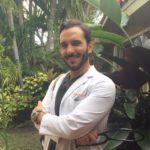Navigating Psychosis: Things Do Get Better
Carlos Larrauri

This post is a follow up to Carlos’ Story of Strength, which is available here.
My name is Carlos, and I’ve been coping with psychosis since I was a teenager. There were times when I wasn’t sure who I was or what would happen next, but in hindsight I can say with certainty that things do get better, especially when families stick together.
By all measures, I had an extremely privileged childhood. My parents, who immigrated to the U.S. from Cuba before I was born, worked hard and made sacrifices so that my two brothers and I could enjoy a middle-class life. As a child, I was happy and sociable. I liked school, and my mother nicknamed me “mini mayor” for my outgoing personality. After eighth grade, however, my demeanor began to shift. An older cousin introduced me to marijuana, and my daily focus became figuring out how to get high. I used weed to cope or connect with other people.
Nevertheless, I was a good student and graduated summa cum laude. At 18 years old, I entered an Early Admission Placement program at the Ohio State University College of Medicine. In hindsight, I may have gone through an untreated episode of depression then during my freshman year. I skipped classes, slept for 10 to 12 hours, gained about 25 pounds, and my GPA dropped below 2.0. I remember feeling like a minority for the first time. Not knowing whom I could talk or reach out to, I struggled. I called my mom and told her I wanted to come home.
Back in Miami, I got a job and studied at community college for a year. With renewed momentum, I left to finish a bachelor’s degree in literature at New College of Florida. There, I continued to struggle. My mind began to fail at processing my environment. I had difficulty sleeping and trouble concentrating. I became increasingly preoccupied with reading religious texts. I developed a profound sense that I was having a divine experience: I started hearing voices assuring me I was a prophet and an angel being initiated into a greater realm of spiritual existence. The whispers evolved into cacophony.
I saw a school psychologist several times, but we failed to identify the growing severity of my situation. As my behavior grew increasingly inappropriate, my loved ones grew increasingly perplexed. Finally, a close family friend called my mom and said, “Something in Carlos has changed that isn’t just stress or drug use.” My parents came to campus the next day and, with my permission, we met with my adviser. Ultimately, I was asked to leave (because of academic and conduct violations) but allowed to finish my senior thesis remotely.
Back home, my mother and I sought out various mental health professionals, but my behavior continued to deteriorate. I had manic energy. I would go to the park to play basketball in the middle of the night, loudly cursing and laughing to myself. My mom, convinced I would be arrested, quietly followed behind me in her minivan. During a fight with my youngest brother, I broke a window with my fist, and he retaliated by throwing the glass back at me. My father, in a state of denial, started referring to my mom as the crazy one for taking me to treatment.
Two weeks shy of my 22nd birthday, I was diagnosed with adult-onset schizophrenia. I had my own misconceptions about what that meant, which left me confused and uncertain about the future. Psychosis had taken me from feeling the highs of thinking I was Jesus Christ to the lows of belonging to the most stigmatized group in society. Would I just stay at home collecting disability and talking to the TV? I felt like being labeled “schizophrenic” would define who I was and further incapacitate me.
In the beginning phases of my recovery, my father would literally hand me my medication and take me by the hand to enroll in community college courses. This required me to get out of the house and navigate my recovery outside the house. I had to learn to cope with hearing voices on the bus and in the classroom. I had to learn how to remain calm and composed, even with the occasional flare-up of psychotic symptoms. It was like having to start my life over at 22 years old: I had to develop a new sense of identity, purpose, and community. My mother encouraged me to attend support groups offered by the local chapter of the National Alliance on Mental Illness. The NAMI community helped to normalize my experience, and I was able to form several close friendships with peers and professional mentors who’d had similar adversities.
With the support of family and friends, I decided early on that I wanted to become a mental health professional to work with others going through psychosis or schizophrenia. I enrolled in nursing school, with the goal of becoming a psychiatric mental health nurse practitioner. I completed an accelerated registered nursing program and began working the night shift at a maximum-security forensic hospital. I routinely cared for the psychiatric and medical needs of patients with serious mental illnesses and pending criminal charges. It was a tough job for many reasons, and the shift work, long hours due to short staffing, and frequency of crisis situations started to take a toll on my mental health. I ultimately left to refocus on graduate school.
My mother recognized that my own mental health was suffering. She asked me to speak with my doctor, who encouraged me to adjust my medication. I had tapered my dosage over time to see whether I could maintain my recovery on the lowest amount of medication or stop it completely. I resisted, but after failing the first several exams at school, I increased my dose, and — sure enough — my academic performance, sleeping, and behavior steadily improved.
Since then, I have been able to live my life in a productive and fruitful way. I understand the need to maintain a medication regimen, possibly for the rest of my life, and to continue to check in with therapists and clinicians. Beyond that, I try to avoid drugs and alcohol, stay physically active, and find meaning and sense in my experience through work and helping others. I’m currently a board-certified psychiatric mental health nurse practitioner. I treat child, adolescent, and adult psychiatry patients in English and Spanish in a collaborative setting with other nurse practitioners, licensed mental health counselors, psychologists, and psychiatrists. I also currently serve on the NAMI board of directors.
Psychosis can be challenging to understand because it can be simultaneously profound, bizarre, and terrifying. I hope that by sharing my story, I will not only help others, but also inform and shape the narrative surrounding early intervention services for psychosis in positive ways. Embracing my identity as an individual in recovery has helped me to manage an immensely challenging illness. It took a scary diagnosis for me to form a healthy identity and develop a strong sense of resilience, but I am now able to find a deep gratification and purpose in helping others overcome their own struggles with mental illness.
My recovery would not have been possible without the team of people who supported me along the way. I am filled with gratitude and forever indebted to friends, family, and my community. If you or your child needs support, I encourage you to reach out to a licensed therapist, who can connect you with mental health care providers and other resources.
Stay strong.
- Carlos
This piece is an excerpt taken from: Intervening Early in Psychosis – a team approach, editors K.V. Hardy, J.S. Ballon, D.L. Noordsy and S. Adelsheim. Washington DC: American Psychiatric Publishing, 2019

Strong 365 guest blogger Carlos Larrauri grew up in Miami as the son of Cuban Americans who left political and economic struggle for a better opportunity in the United States. Carlos is a board certified psychiatric nurse practitioner. He aspires to interface clinical practice, research and policy to reduce health inequities for people living with serious mental illness. Carlos is on the board of directors of the National Alliance on Mental Illness (NAMI), as well as NAMI Miami-Dade County. He also serves on Strong 365’s Leadership Board. You can learn more about Carlos and his advocacy at carloslarrauri.com.
At Strong 365, we believe that the strength to persist and thrive through a mental health challenge exists in all of us. Join our community on Instagram, Facebook, and Twitter and keep the conversation going about how to live well with psychosis.
Want to share your story of strength? You can submit it here or email it to info@strong365.org.
The strength to persist and thrive through mental health struggles exists in all of us. 🫶🏽
Join our Strong365 Community on Instagram, Facebook, and Twitter to keep the conversation going. Or, learn how you can get involved to support us on our mission for mental health.
